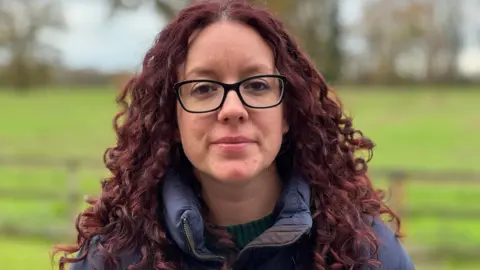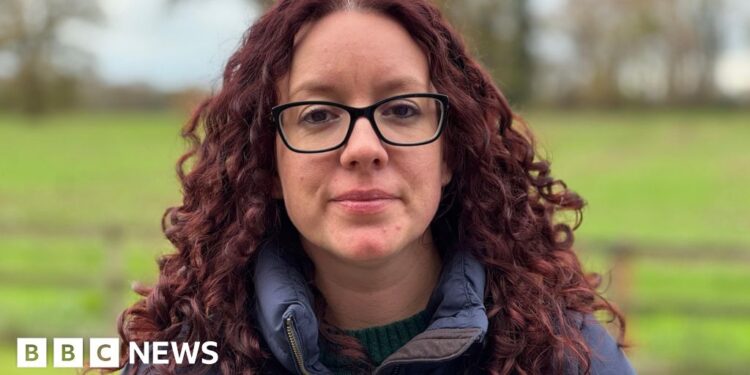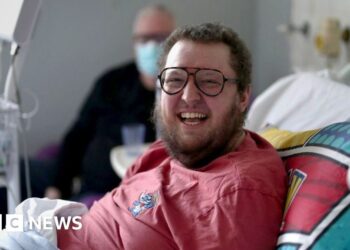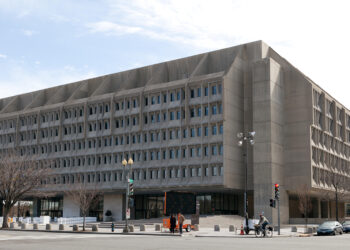Joanne WrittleWest Midlands health correspondent, in Shropshire
 BBC
BBCWhen Kayleigh Griffiths lost her baby daughter, Pippa, in 2016 through maternity failings in Shropshire, she had no idea how many times she would have to retell her traumatic story at future medical appointments.
She has worked to get a so-called “Ockenden alert” on her medical notes – an idea which came out of meetings with other traumatised families.
Donna Ockenden is the senior midwife who led the 2022 review which found more than 200 babies and nine mothers in Shropshire could have survived with better care.
Mrs Grifiths wants the alert to be offered to more affected families, and eventually to people nationally.
She said it meant health workers “can see that alert and have a look at what that means for us”.
“And it might just mean that they take a bit of extra time to read our notes, to understand what our history is, so that we don’t have to keep going over that same story at every single appointment because it is retraumatising,” she added.
Pippa was her second daughter. She died of an infection, Group B Strep. In 2017 a coroner ruled her death was preventable.
At the time of the inquest, Mrs Griffiths was pregnant with her third child, who is now eight.
When she gave birth to him, he was temporarily taken to neonatal care, but she was not told this before being taken to see him. She said it was “so traumatising to see him like that”.
Thankfully, he was ok. But Mrs Griffiths said that “having that alert on our records would probably have stopped all of that, because people would have known at each stage of our care that we’d been through so much already”.

The Reverend Charlotte Cheshire also has the Ockenden alert on her notes, and is waiting for it to be added to those of her 14-year-old son, Adam.
Adam suffered multiple disabilities after developing an infection. The Ockenden review in 2022 found that 94 children, like Adam, suffered life-changing injuries.
Rev Cheshire has to attend frequent medical appointments with Adam, who is autistic, including for his profound learning difficulties, as well as hearing and sight impairments.
Before the alert was added, she frequently had to retell the story of how he was failed.
“In a situation where there is admitted medical negligence and harm at birth, that’s revisiting the trauma every single time, and I genuinely believe that if they are seeing us, if they are treating us, they need to at least know the overview,” she said.
“Nothing can undo the harm now that’s been done to us, but it wasn’t just a moment in time that fades into history.
“This is a harm that stays with me and Adam for the rest of our lives, so it matters that they know, ‘oh, this is one of those families that carries a very complex level of trauma’, and have no option but to trust another clinician with our medical care, despite everything that we’ve already been through.”
Mrs Griffiths is pushing for other improvements in Shropshire too, including reviewing how doctors in training learn about baby loss.
She also wants the medical notes alert to be offered to other people.
“Nationally we know there’s a problem in maternity, so other people could have something similar to this alert on their records,” she said.
“We could look to roll it out in other services. People have such varied experiences, sexual abuse, mental health. It could be rolled out so much wider that [it] makes people’s care easier.”
The Shrewsbury and Telford Hospital NHS Trust said it hoped to roll out the alert to other areas of care across the organisation.
“We will listen and learn from families, with the support of Donna Ockenden, as we strive to provide excellent maternity and neonatal services,” said group chief executive Jo Williams.
“We hope that the alert will provide positive and lasting change,” she added.
Source link : https://www.bbc.com/news/articles/ckg9z8r3978o?at_medium=RSS&at_campaign=rss
Author :
Publish date : 2025-11-28 06:25:00
Copyright for syndicated content belongs to the linked Source.















